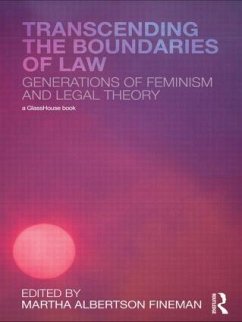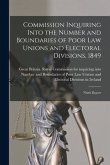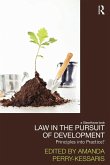Martha Albertson Fineman (Hrsg.)Generations of Feminism and Legal Theory
Transcending the Boundaries of Law
Generations of Feminism and Legal Theory
Herausgeber: Fineman, Martha Albertson
Martha Albertson Fineman (Hrsg.)Generations of Feminism and Legal Theory
Transcending the Boundaries of Law
Generations of Feminism and Legal Theory
Herausgeber: Fineman, Martha Albertson
- Broschiertes Buch
- Merkliste
- Auf die Merkliste
- Bewerten Bewerten
- Teilen
- Produkt teilen
- Produkterinnerung
- Produkterinnerung
Transcending the Boundaries of Law brings together three generations of the most respected feminist legal theorists in order to assess the past, the present and the future of feminist legal thought in the Law and Society tradition. It is a ground-breaking collection that will be central to the further development of feminism and related critical theories.
Andere Kunden interessierten sich auch für
![Commission Inquiring Into the Number and Boundaries of Poor Law Unions and Electoral Divisions, 1849: Ninth Report Commission Inquiring Into the Number and Boundaries of Poor Law Unions and Electoral Divisions, 1849: Ninth Report]() Commission Inquiring Into the Number and Boundaries of Poor Law Unions and Electoral Divisions, 1849: Ninth Report17,99 €
Commission Inquiring Into the Number and Boundaries of Poor Law Unions and Electoral Divisions, 1849: Ninth Report17,99 €![Fighting at the Legal Boundaries Fighting at the Legal Boundaries]() Kenneth WatkinFighting at the Legal Boundaries78,99 €
Kenneth WatkinFighting at the Legal Boundaries78,99 €![The High Court of Parliament and Its Supremacy: An Historical Essay On the Boundaries Between Legislation and Adjudication in England The High Court of Parliament and Its Supremacy: An Historical Essay On the Boundaries Between Legislation and Adjudication in England]() Charles Howard McilwainThe High Court of Parliament and Its Supremacy: An Historical Essay On the Boundaries Between Legislation and Adjudication in England28,99 €
Charles Howard McilwainThe High Court of Parliament and Its Supremacy: An Historical Essay On the Boundaries Between Legislation and Adjudication in England28,99 €![The Boundaries of 'the Japanese' The Boundaries of 'the Japanese']() Leonie R SticklandThe Boundaries of 'the Japanese'36,99 €
Leonie R SticklandThe Boundaries of 'the Japanese'36,99 €![The Law and Ethics of Medical Research The Law and Ethics of Medical Research]() Aurora PlomerThe Law and Ethics of Medical Research50,99 €
Aurora PlomerThe Law and Ethics of Medical Research50,99 €![Law in the Pursuit of Development Law in the Pursuit of Development]() Law in the Pursuit of Development34,99 €
Law in the Pursuit of Development34,99 €![Civil Disobedience and the German Courts Civil Disobedience and the German Courts]() Peter E. QuintCivil Disobedience and the German Courts68,99 €
Peter E. QuintCivil Disobedience and the German Courts68,99 €-
-
-
Transcending the Boundaries of Law brings together three generations of the most respected feminist legal theorists in order to assess the past, the present and the future of feminist legal thought in the Law and Society tradition. It is a ground-breaking collection that will be central to the further development of feminism and related critical theories.
Hinweis: Dieser Artikel kann nur an eine deutsche Lieferadresse ausgeliefert werden.
Hinweis: Dieser Artikel kann nur an eine deutsche Lieferadresse ausgeliefert werden.
Produktdetails
- Produktdetails
- Verlag: Routledge-Cavendish
- 1. Auflage
- Seitenzahl: 432
- Erscheinungstermin: 2. Juli 2010
- Englisch
- Abmessung: 234mm x 156mm x 23mm
- Gewicht: 652g
- ISBN-13: 9780415481403
- ISBN-10: 0415481406
- Artikelnr.: 29920471
- Herstellerkennzeichnung
- Libri GmbH
- Europaallee 1
- 36244 Bad Hersfeld
- gpsr@libri.de
- Verlag: Routledge-Cavendish
- 1. Auflage
- Seitenzahl: 432
- Erscheinungstermin: 2. Juli 2010
- Englisch
- Abmessung: 234mm x 156mm x 23mm
- Gewicht: 652g
- ISBN-13: 9780415481403
- ISBN-10: 0415481406
- Artikelnr.: 29920471
- Herstellerkennzeichnung
- Libri GmbH
- Europaallee 1
- 36244 Bad Hersfeld
- gpsr@libri.de
Martha Albertson Fineman is Robert W. Woodruff Professor of Law at Emory University and Director and Founder of the Feminism and Legal Theory Project.
Introduction
Martha Albertson Fineman Section One: From Women in the Law to Feminist Legal Theory 1. "Le Féminisme" and Professionalism in Law: Reflections on the History of Women Lawyers
Mary Jane Mossman 2. An Inconsistent Affair: Feminism and the Legal Academy
Margaret Thornton 3. Have Pantsuit
Will Travel
Patricia J. Williams 4. Grappling with Equality: One Feminist Journey
Martha Albertson Fineman Section Two: Engaging Equality 5. What's So Hard About Sex Equality?: Nature
Culture
and Social Engineering
Linda C. McClain 6. No Male or Female
Mary Anne Case 7. The New Faces of Feminism: Feminism in Action and Organic Feminists in a Post-Feminist Era
Michèle Alexandre Section Three: Engaging Bodies 8. Feminist Legal Theory as Embodied Justice
Isabel Karpin and Roxanne Mykitiuk 9. Privatization and Punishment in the New Age of Reprogenetics
Dorothy E. Roberts 10. A Tale of Two Bodies: The Male Body and Feminist Legal Theory
Michael Thomson Section Four: Engaging Universals and Engaging Identities 11. The Vulnerable Subject: Anchoring Equality in the Human Condition
Martha Albertson Fineman 12. Resistance in the Afterlife of Identity
Darren Lenard Hutchinson 13. Gender Equality
Citizenship Status
and the Politics of Belonging
Siobhán Mullally Section Five: Engaging Intimacy and Family 14. When and Where They Enter
Robin West 15. New Frontiers in Family Law
Laura T. Kessler 16. Family Law
Feminist Legal Theory
and the Problem of Racial Hierarchy
Twila L. Perry 17. Living Alone: New Demographic Research
Adam P. Romero Section Six: Engaging the State 18. Learning the Lessons: What Feminist Legal Theory Teaches International Human Rights Law and Practice
Fionnuala Ní Aoláin 19. Prosecuting Sexual Violence in the Ad Hoc International Criminal Tribunals for Rwanda and the Former Yugoslavia
Fiona de Londras 20. Theorizing the More Responsive State: Transcending the (National) Boundaries of Law
Laura Spitz Section Seven: Engaging Politics 21. Gender Scripting and Deliberative Democracy
Holning Lau 22. The Accidental Feminist: A Story of Transformation
Constitutional and Otherwise
Victoria F. Nourse 23. Defending and Developing Critical Feminist Theory as Law Leans Rightward
Martha T. McCluskey
Martha Albertson Fineman Section One: From Women in the Law to Feminist Legal Theory 1. "Le Féminisme" and Professionalism in Law: Reflections on the History of Women Lawyers
Mary Jane Mossman 2. An Inconsistent Affair: Feminism and the Legal Academy
Margaret Thornton 3. Have Pantsuit
Will Travel
Patricia J. Williams 4. Grappling with Equality: One Feminist Journey
Martha Albertson Fineman Section Two: Engaging Equality 5. What's So Hard About Sex Equality?: Nature
Culture
and Social Engineering
Linda C. McClain 6. No Male or Female
Mary Anne Case 7. The New Faces of Feminism: Feminism in Action and Organic Feminists in a Post-Feminist Era
Michèle Alexandre Section Three: Engaging Bodies 8. Feminist Legal Theory as Embodied Justice
Isabel Karpin and Roxanne Mykitiuk 9. Privatization and Punishment in the New Age of Reprogenetics
Dorothy E. Roberts 10. A Tale of Two Bodies: The Male Body and Feminist Legal Theory
Michael Thomson Section Four: Engaging Universals and Engaging Identities 11. The Vulnerable Subject: Anchoring Equality in the Human Condition
Martha Albertson Fineman 12. Resistance in the Afterlife of Identity
Darren Lenard Hutchinson 13. Gender Equality
Citizenship Status
and the Politics of Belonging
Siobhán Mullally Section Five: Engaging Intimacy and Family 14. When and Where They Enter
Robin West 15. New Frontiers in Family Law
Laura T. Kessler 16. Family Law
Feminist Legal Theory
and the Problem of Racial Hierarchy
Twila L. Perry 17. Living Alone: New Demographic Research
Adam P. Romero Section Six: Engaging the State 18. Learning the Lessons: What Feminist Legal Theory Teaches International Human Rights Law and Practice
Fionnuala Ní Aoláin 19. Prosecuting Sexual Violence in the Ad Hoc International Criminal Tribunals for Rwanda and the Former Yugoslavia
Fiona de Londras 20. Theorizing the More Responsive State: Transcending the (National) Boundaries of Law
Laura Spitz Section Seven: Engaging Politics 21. Gender Scripting and Deliberative Democracy
Holning Lau 22. The Accidental Feminist: A Story of Transformation
Constitutional and Otherwise
Victoria F. Nourse 23. Defending and Developing Critical Feminist Theory as Law Leans Rightward
Martha T. McCluskey
Introduction
Martha Albertson Fineman Section One: From Women in the Law to Feminist Legal Theory 1. "Le Féminisme" and Professionalism in Law: Reflections on the History of Women Lawyers
Mary Jane Mossman 2. An Inconsistent Affair: Feminism and the Legal Academy
Margaret Thornton 3. Have Pantsuit
Will Travel
Patricia J. Williams 4. Grappling with Equality: One Feminist Journey
Martha Albertson Fineman Section Two: Engaging Equality 5. What's So Hard About Sex Equality?: Nature
Culture
and Social Engineering
Linda C. McClain 6. No Male or Female
Mary Anne Case 7. The New Faces of Feminism: Feminism in Action and Organic Feminists in a Post-Feminist Era
Michèle Alexandre Section Three: Engaging Bodies 8. Feminist Legal Theory as Embodied Justice
Isabel Karpin and Roxanne Mykitiuk 9. Privatization and Punishment in the New Age of Reprogenetics
Dorothy E. Roberts 10. A Tale of Two Bodies: The Male Body and Feminist Legal Theory
Michael Thomson Section Four: Engaging Universals and Engaging Identities 11. The Vulnerable Subject: Anchoring Equality in the Human Condition
Martha Albertson Fineman 12. Resistance in the Afterlife of Identity
Darren Lenard Hutchinson 13. Gender Equality
Citizenship Status
and the Politics of Belonging
Siobhán Mullally Section Five: Engaging Intimacy and Family 14. When and Where They Enter
Robin West 15. New Frontiers in Family Law
Laura T. Kessler 16. Family Law
Feminist Legal Theory
and the Problem of Racial Hierarchy
Twila L. Perry 17. Living Alone: New Demographic Research
Adam P. Romero Section Six: Engaging the State 18. Learning the Lessons: What Feminist Legal Theory Teaches International Human Rights Law and Practice
Fionnuala Ní Aoláin 19. Prosecuting Sexual Violence in the Ad Hoc International Criminal Tribunals for Rwanda and the Former Yugoslavia
Fiona de Londras 20. Theorizing the More Responsive State: Transcending the (National) Boundaries of Law
Laura Spitz Section Seven: Engaging Politics 21. Gender Scripting and Deliberative Democracy
Holning Lau 22. The Accidental Feminist: A Story of Transformation
Constitutional and Otherwise
Victoria F. Nourse 23. Defending and Developing Critical Feminist Theory as Law Leans Rightward
Martha T. McCluskey
Martha Albertson Fineman Section One: From Women in the Law to Feminist Legal Theory 1. "Le Féminisme" and Professionalism in Law: Reflections on the History of Women Lawyers
Mary Jane Mossman 2. An Inconsistent Affair: Feminism and the Legal Academy
Margaret Thornton 3. Have Pantsuit
Will Travel
Patricia J. Williams 4. Grappling with Equality: One Feminist Journey
Martha Albertson Fineman Section Two: Engaging Equality 5. What's So Hard About Sex Equality?: Nature
Culture
and Social Engineering
Linda C. McClain 6. No Male or Female
Mary Anne Case 7. The New Faces of Feminism: Feminism in Action and Organic Feminists in a Post-Feminist Era
Michèle Alexandre Section Three: Engaging Bodies 8. Feminist Legal Theory as Embodied Justice
Isabel Karpin and Roxanne Mykitiuk 9. Privatization and Punishment in the New Age of Reprogenetics
Dorothy E. Roberts 10. A Tale of Two Bodies: The Male Body and Feminist Legal Theory
Michael Thomson Section Four: Engaging Universals and Engaging Identities 11. The Vulnerable Subject: Anchoring Equality in the Human Condition
Martha Albertson Fineman 12. Resistance in the Afterlife of Identity
Darren Lenard Hutchinson 13. Gender Equality
Citizenship Status
and the Politics of Belonging
Siobhán Mullally Section Five: Engaging Intimacy and Family 14. When and Where They Enter
Robin West 15. New Frontiers in Family Law
Laura T. Kessler 16. Family Law
Feminist Legal Theory
and the Problem of Racial Hierarchy
Twila L. Perry 17. Living Alone: New Demographic Research
Adam P. Romero Section Six: Engaging the State 18. Learning the Lessons: What Feminist Legal Theory Teaches International Human Rights Law and Practice
Fionnuala Ní Aoláin 19. Prosecuting Sexual Violence in the Ad Hoc International Criminal Tribunals for Rwanda and the Former Yugoslavia
Fiona de Londras 20. Theorizing the More Responsive State: Transcending the (National) Boundaries of Law
Laura Spitz Section Seven: Engaging Politics 21. Gender Scripting and Deliberative Democracy
Holning Lau 22. The Accidental Feminist: A Story of Transformation
Constitutional and Otherwise
Victoria F. Nourse 23. Defending and Developing Critical Feminist Theory as Law Leans Rightward
Martha T. McCluskey








